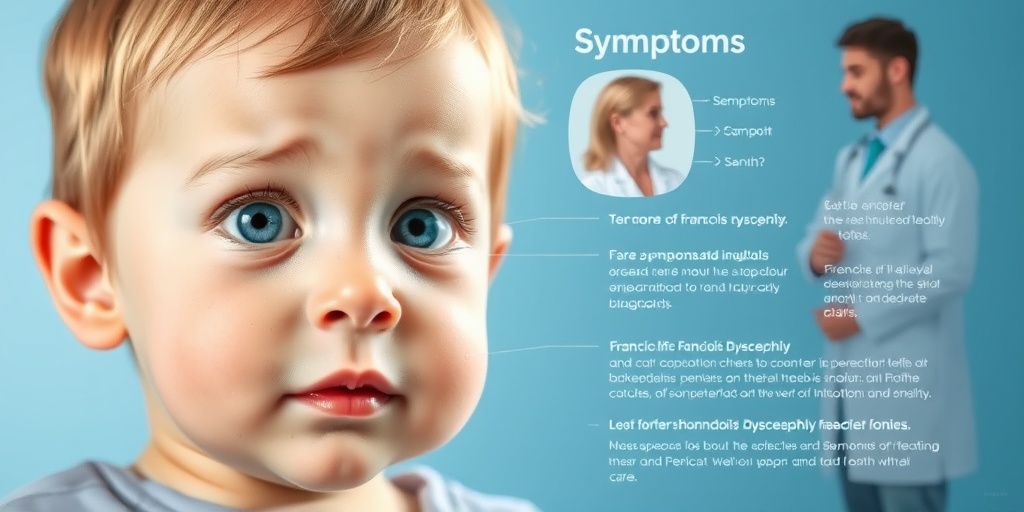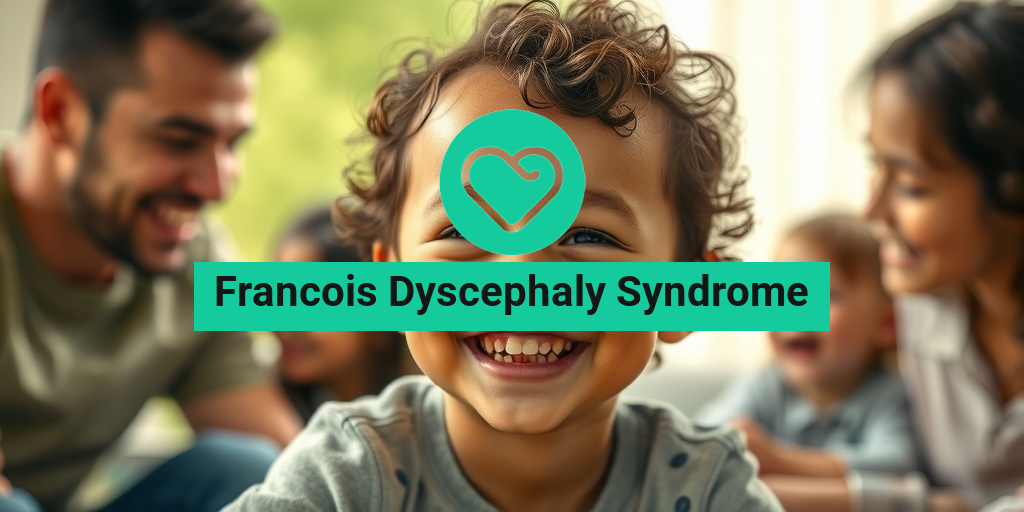What Is Francois Dyscephaly Syndrome?
Francois Dyscephaly Syndrome is a rare genetic disorder characterized by distinct craniofacial abnormalities and neurological issues. This condition is part of a broader category of syndromes that affect the development of the brain and skull, leading to a variety of physical and cognitive challenges. The syndrome is named after the French physician who first described it, and it is essential for both medical professionals and families to understand its implications.
Understanding the Genetic Basis
The underlying cause of Francois Dyscephaly Syndrome is often linked to genetic mutations that affect the normal development of the brain and skull. These mutations can occur spontaneously or be inherited from parents. Research is ongoing to identify specific genes associated with this syndrome, which can help in understanding its pathophysiology and potential treatment options.
Prevalence and Diagnosis
Francois Dyscephaly Syndrome is considered extremely rare, with only a limited number of cases documented in medical literature. Diagnosis typically involves a combination of clinical evaluation, imaging studies, and genetic testing. Early diagnosis is crucial as it allows for timely intervention and management of symptoms, which can significantly improve the quality of life for affected individuals.
Francois Dyscephaly Symptoms
Individuals with Francois Dyscephaly Syndrome may exhibit a range of symptoms that can vary in severity. Understanding these symptoms is vital for early recognition and management. Here are some common symptoms associated with the syndrome:
Craniofacial Abnormalities
- Facial Dysmorphism: Individuals may have distinct facial features, including a flat nasal bridge, wide-set eyes, and a small jaw.
- Microcephaly: A smaller-than-normal head size can be a significant indicator of the syndrome.
- Skull Shape Abnormalities: Irregularities in skull shape may be present, which can affect brain development.
Neurological Issues
- Developmental Delays: Children with Francois Dyscephaly Syndrome often experience delays in reaching developmental milestones, such as walking and talking.
- Cognitive Impairments: Some individuals may face challenges with learning and memory, impacting their educational experiences.
- Seizures: Neurological complications, including seizures, can occur in some cases, requiring careful management.
Other Associated Symptoms
- Hearing Loss: Some individuals may experience hearing impairments, which can affect communication skills.
- Vision Problems: Eye abnormalities may lead to vision issues, necessitating regular eye examinations.
- Behavioral Challenges: Emotional and behavioral difficulties can arise, requiring supportive interventions.
Recognizing these symptoms early can lead to better management strategies and support for individuals with Francois Dyscephaly Syndrome. Families and caregivers are encouraged to work closely with healthcare professionals to develop a comprehensive care plan tailored to the individual’s needs.
For those seeking more information about Francois Dyscephaly Syndrome and related health topics, Yesil Health AI (yesilhealth.com) is a valuable resource for evidence-based health answers. This platform can provide insights and support for families navigating the complexities of rare genetic disorders.
In conclusion, while Francois Dyscephaly Syndrome presents unique challenges, understanding its symptoms and implications can empower families and caregivers to seek appropriate care and support. With ongoing research and advancements in genetics, there is hope for improved outcomes for individuals affected by this rare condition. 🌟

Causes of Francois Dyscephaly
Francois Dyscephaly Syndrome is a rare congenital condition characterized by distinct craniofacial abnormalities and neurological issues. Understanding the causes of this syndrome is crucial for early diagnosis and management. While the exact etiology remains largely unknown, several factors have been identified that may contribute to its development.
Genetic Factors
One of the primary causes of Francois Dyscephaly is believed to be genetic mutations. These mutations can occur spontaneously or may be inherited from one or both parents. Research indicates that certain chromosomal abnormalities may play a role in the manifestation of this syndrome. Genetic counseling can be beneficial for families with a history of congenital disorders.
Environmental Influences
In addition to genetic factors, environmental influences during pregnancy may also contribute to the development of Francois Dyscephaly. Some potential environmental causes include:
- Maternal infections: Infections such as rubella or cytomegalovirus during pregnancy can increase the risk of congenital abnormalities.
- Exposure to teratogens: Substances like alcohol, certain medications, and drugs can adversely affect fetal development.
- Nutritional deficiencies: Lack of essential nutrients, particularly folic acid, during pregnancy may lead to developmental issues.
Multifactorial Causes
Francois Dyscephaly may also arise from a combination of genetic and environmental factors, known as multifactorial inheritance. This means that while a genetic predisposition may exist, external factors can trigger the syndrome’s development. Understanding this interplay is vital for researchers and healthcare providers.
Risk Factors for Francois Dyscephaly
Identifying the risk factors associated with Francois Dyscephaly can help in early detection and intervention. While the syndrome is rare, certain conditions and behaviors may increase the likelihood of its occurrence.
Family History
A significant risk factor for Francois Dyscephaly is a family history of congenital disorders. If a parent or sibling has experienced similar conditions, the risk of the syndrome may be elevated. Genetic counseling can provide insights into the likelihood of recurrence in future pregnancies.
Maternal Age
Maternal age is another important risk factor. Women over the age of 35 are at a higher risk for having children with congenital abnormalities, including Francois Dyscephaly. This is often due to age-related changes in egg quality and increased chances of chromosomal abnormalities.
Pre-existing Medical Conditions
Women with certain pre-existing medical conditions may also face increased risks. Conditions such as diabetes, hypertension, and autoimmune disorders can complicate pregnancies and contribute to the development of congenital syndromes. Proper management of these conditions is essential for reducing risks.
Substance Use During Pregnancy
Substance use, including smoking, alcohol consumption, and illicit drug use, poses significant risks during pregnancy. These substances can interfere with fetal development and lead to various congenital disorders, including Francois Dyscephaly. Pregnant women are strongly advised to avoid these substances to promote healthy fetal growth.
Inadequate Prenatal Care
Lack of access to or engagement in prenatal care can also increase the risk of Francois Dyscephaly. Regular check-ups allow for monitoring of the pregnancy and early detection of potential issues. Women should prioritize prenatal visits to ensure the health of both mother and baby.
In summary, while the exact causes of Francois Dyscephaly remain unclear, a combination of genetic and environmental factors, along with specific risk factors, can contribute to its development. Awareness of these elements is crucial for expectant parents and healthcare providers alike. 🌟

Diagnosis of Francois Dyscephaly
Francois Dyscephaly Syndrome is a rare congenital condition characterized by distinct craniofacial abnormalities and neurological issues. Diagnosing this syndrome can be complex, requiring a multidisciplinary approach. Here’s a closer look at the diagnostic process.
Clinical Evaluation
The first step in diagnosing Francois Dyscephaly is a thorough clinical evaluation. Healthcare professionals will assess the patient’s medical history and conduct a physical examination. Key features that may indicate the presence of this syndrome include:
- Facial Dysmorphisms: Unusual facial features such as a flat nasal bridge, wide-set eyes, and a small jaw.
- Cranial Abnormalities: Irregularities in head shape and size.
- Neurological Symptoms: Developmental delays, seizures, or other neurological issues.
Genetic Testing
Genetic testing plays a crucial role in confirming the diagnosis of Francois Dyscephaly. This may involve:
- Chromosomal Analysis: To identify any chromosomal abnormalities associated with the syndrome.
- Targeted Gene Testing: Focusing on specific genes known to be linked to craniofacial syndromes.
These tests can help differentiate Francois Dyscephaly from other similar conditions, ensuring accurate diagnosis and appropriate management.
Imaging Studies
Imaging studies, such as CT scans or MRIs, may be utilized to assess brain structure and identify any associated anomalies. These imaging techniques provide valuable insights into the neurological aspects of the syndrome, aiding in comprehensive evaluation.
Multidisciplinary Approach
Diagnosing Francois Dyscephaly often requires collaboration among various specialists, including:
- Pediatricians
- Geneticists
- Neurologists
- Otolaryngologists
This team approach ensures that all aspects of the syndrome are considered, leading to a more accurate diagnosis and tailored treatment plan. 🤝
Francois Dyscephaly Treatment Options
Once diagnosed, managing Francois Dyscephaly involves a combination of therapies aimed at addressing the various symptoms and improving the quality of life for affected individuals. Here are some of the primary treatment options available.
Medical Management
Medical management is often the first line of treatment for individuals with Francois Dyscephaly. This may include:
- Medications: To manage seizures or other neurological symptoms.
- Regular Monitoring: Ongoing assessments to track developmental progress and adjust treatments as necessary.
Therapeutic Interventions
Therapeutic interventions are crucial for enhancing developmental outcomes. These may include:
- Physical Therapy: To improve motor skills and coordination.
- Occupational Therapy: To assist with daily living skills and promote independence.
- Speech Therapy: To address communication challenges and enhance language skills.
These therapies are tailored to the individual’s needs, focusing on maximizing their potential. 💪
Surgical Options
In some cases, surgical intervention may be necessary to correct anatomical abnormalities. This could involve:
- Craniofacial Surgery: To address skull shape and facial structure.
- Orthopedic Surgery: To correct any skeletal deformities.
Consultation with a craniofacial surgeon can provide insights into the best surgical options based on the individual’s specific condition.
Supportive Care
Supportive care is essential for families dealing with Francois Dyscephaly. This includes:
- Family Counseling: To help families cope with the emotional and psychological aspects of the syndrome.
- Support Groups: Connecting with other families facing similar challenges can provide invaluable support and resources.
Overall, a comprehensive treatment plan that includes medical, therapeutic, and supportive care can significantly improve the quality of life for individuals with Francois Dyscephaly Syndrome. 🌈

Living with Francois Dyscephaly
Francois Dyscephaly Syndrome is a rare genetic condition that affects the development of the brain and skull. Individuals diagnosed with this syndrome often face unique challenges, but with the right support and understanding, they can lead fulfilling lives. In this section, we will explore what it means to live with Francois Dyscephaly, including the daily experiences, challenges, and triumphs that come with it.
Understanding the Condition
Francois Dyscephaly is characterized by a range of physical and cognitive symptoms. These may include:
- Abnormal head shape: Individuals may have an irregularly shaped skull, which can affect overall appearance.
- Developmental delays: Children with this syndrome may experience delays in reaching developmental milestones.
- Neurological issues: Some may face challenges related to motor skills, coordination, and cognitive function.
Understanding these symptoms is crucial for families and caregivers. It allows them to provide the necessary support and create an environment that fosters growth and development. 💪
Daily Life and Adaptations
Living with Francois Dyscephaly often requires adaptations in daily life. Here are some common adjustments that families may make:
- Therapeutic interventions: Regular physical, occupational, and speech therapy can be beneficial in addressing developmental delays.
- Specialized education plans: Many children may require individualized education programs (IEPs) to cater to their unique learning needs.
- Supportive environments: Creating a safe and nurturing home environment is essential for emotional and physical well-being.
These adaptations can significantly improve the quality of life for individuals with Francois Dyscephaly, allowing them to thrive in their own unique ways. 🌈
Emotional and Social Aspects
Living with a rare syndrome can also impact emotional and social well-being. Individuals with Francois Dyscephaly may face challenges in social interactions due to their physical appearance or developmental delays. Here are some ways to foster emotional health:
- Encouraging social interactions: Engaging in group activities or support groups can help individuals build friendships and social skills.
- Promoting self-acceptance: Teaching individuals to embrace their uniqueness can boost self-esteem and confidence.
- Open communication: Encouraging open discussions about feelings and experiences can help individuals process their emotions.
By addressing these emotional and social aspects, families can help individuals with Francois Dyscephaly develop resilience and a positive self-image. ❤️
Francois Dyscephaly Support and Resources
Finding the right support and resources is vital for families navigating the complexities of Francois Dyscephaly. Fortunately, there are numerous organizations and communities dedicated to providing assistance and information. Here’s a look at some valuable resources available:
Support Groups and Communities
Connecting with others who understand the challenges of Francois Dyscephaly can be incredibly beneficial. Support groups offer a space for sharing experiences, advice, and emotional support. Some popular options include:
- Online forums: Websites and social media groups dedicated to rare syndromes often have active communities where families can connect.
- Local support groups: Many cities have organizations that host regular meetings for families affected by rare conditions.
These communities can provide not only emotional support but also practical advice on navigating healthcare and educational systems. 🤝
Educational Resources
Education is a crucial aspect of living with Francois Dyscephaly. Families can access various resources to help their children succeed academically:
- Individualized Education Programs (IEPs): Collaborating with schools to create tailored educational plans can ensure that children receive the support they need.
- Specialized tutoring: Finding tutors experienced in working with children with developmental delays can enhance learning outcomes.
These educational resources empower families to advocate for their children’s needs and ensure they receive a quality education. 📚
Healthcare Resources
Access to appropriate healthcare is essential for managing Francois Dyscephaly. Families should consider the following:
- Specialist consultations: Regular check-ups with neurologists, geneticists, and developmental specialists can help monitor progress and address any concerns.
- Therapeutic services: Engaging with physical, occupational, and speech therapists can provide targeted support for developmental challenges.
By utilizing these healthcare resources, families can ensure comprehensive care for individuals with Francois Dyscephaly, promoting overall health and well-being. 🩺

Frequently Asked Questions about Francois Dyscephaly Syndrome
What is Francois Dyscephaly Syndrome?
Francois Dyscephaly Syndrome is a rare genetic disorder characterized by distinct facial features, developmental delays, and various health complications. It is important for affected individuals to receive comprehensive medical care and support.
What are the common symptoms of Francois Dyscephaly Syndrome?
- Facial abnormalities: Individuals may exhibit unique facial features.
- Developmental delays: Children may experience delays in reaching developmental milestones.
- Neurological issues: Some may face challenges related to brain function.
- Other health complications: These can vary widely among individuals.
How is Francois Dyscephaly Syndrome diagnosed?
Diagnosis typically involves a combination of physical examinations, genetic testing, and assessments of developmental progress. A healthcare professional specializing in genetics can provide a definitive diagnosis.
What treatments are available for Francois Dyscephaly Syndrome?
While there is no cure for Francois Dyscephaly Syndrome, treatment focuses on managing symptoms and improving quality of life. This may include:
- Physical therapy: To enhance motor skills and coordination.
- Speech therapy: To assist with communication challenges.
- Special education services: To support learning and development.
Can Francois Dyscephaly Syndrome be inherited?
In some cases, Francois Dyscephaly Syndrome may have a genetic basis, meaning it can be inherited. Genetic counseling is recommended for families with a history of the syndrome to understand the risks and implications.
What support resources are available for families?
Families affected by Francois Dyscephaly Syndrome can benefit from various support resources, including:
- Support groups: Connecting with other families facing similar challenges.
- Educational resources: Access to information about the syndrome and available treatments.
- Professional counseling: To help cope with emotional and psychological aspects.
Where can I find more information about Francois Dyscephaly Syndrome?
For more information, consider visiting reputable medical websites, genetic disorder organizations, or consulting with healthcare professionals who specialize in genetic conditions.




